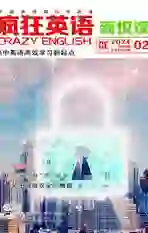《小妇人》:只为活出自己喜欢的样子
2024-03-26梁姗姗
梁姗姗


About the author
《小妇人》的作者路易莎·梅·奥尔科特(1832—1888),是一位美国女作家。為帮助维持贫穷家庭的日常开销,路易莎教过书,当过裁缝、护士,做过洗熨活,还出去做过用人。
受当作家和教师的父亲的熏陶,她很早就对写作产生了兴趣,1868年出版的《小妇人》令她一举成名。成名后,她继续撰写小说。1888年3月6日,她因病在波士顿去世。其代表作有《小妇人》《小男人》《乔的男孩子们》《经验的故事》等。
About the novel
《小妇人》是写给每个女孩的成长之书,是一部带有半自传色彩的家庭伦理小说。它曾打动无数女性,是一部恒久闪光的女性优秀读物,被誉为“千万女性的成长经典”。
小说主要描写了四名女性由女孩成长为小妇人的岁月,讲述了她们不羁的爱情经历及各自追寻理想与归宿的过程。尽管她们的理想和命运都不尽相同,但不论遇到何种困境,她们都坚持着对自我的要求和对生活的热爱。小说提倡善良、忠诚、无私、慷慨、宽容、坚韧、勇敢,这些是人类永远尊崇和追求的美德和信仰。所有这些,赋予这本书超越时代的生命力,这也正是它成为经典的原因。
About the excerpt
该选文描述了乔在写作时的状态。乔,独立自信,追求平等,感性与理性并存,忠于自己所热爱的东西,尽全力去维护着自己的诗与远方。或许,只有在穿上那一身“涂鸦服”写作时,她才是真正的自己,拥有自己的世界,能感受到幸福、感受到活着的意义。无疑,乔的世界是纯粹的。她极早地发现了自己的天赋,并愿意付出努力,珍惜无数个灵感——投稿,并执着于梦想和事业。但她也会孤独,在夜深人静时,在失去创作灵感的瞬间,她又是一个深深陷入旋涡、迷茫、挣扎着、反抗着的女性。她用自己的人生经历告诉读者们“I'd rather be a free spinster and paddle my own canoe.”(我宁愿做一个自由的老姑娘,自己划自己的船)。
重难点词汇
scribble v. 潦草地写;乱涂;乱画
vortex n. 旋涡
pinafore n. 围裙装
adorn v. 装饰;装扮
bow n. 蝴蝶结
deck n. 木制平台
beacon n. 灯塔
pop v. 突然出现;冷不防冒出
venture v. 小心地说;谨慎地做
askew adv. 歪;斜
pluck v. 摘;拔
gaily adv. 艳丽地;欢乐地
give oneself up to sth 致力于;沉溺于
blissful adj. 极为高兴的;幸福的
forsake v. 抛弃;离开
divine adj. 神的;绝妙的;非凡的
afflatus n. 灵感
despondent adj. 沮丧的;泄气的
阅读重点
1. 乔在写作时的状态如何?
2. 哪些细节反映出乔是全身心投入写作的?
3. 乔的家人在她写作时有何态度和反应?
4. 选文中哪些句子使用了修辞手法?
文本分析
What
乔从小就想要当一个作家,她更想着通过写作,靠自己挣钱补贴家用。选文描述了主人公乔在写作时的状态以及她的家人在她写作时的态度和反应。
Why
选文通过描述乔在写作时的状态以及家人的举动,体现了乔对写作的无限热情与热爱,也展现出了家人对乔的关心。
How
选文情节平实细腻,结构简单,内容寓意深远,富有强烈的感染力。
Fortune suddenly smiled upon Jo, anddropped a good luck penny in her path.Not a golden penny, exactly, but I doubt ifhalf a million would have given more realhappiness than the little sum did that cameto her in this way.
Every few weeks she would shut her?self up in her room, put on her“ scribblingsuit”, and“ fall into a vortex”, as she expressed it, writing away at her novel with all herheart and soul, for till that was finished she could find no peace. Her“ scribbling suit” con?sisted of a black woolen pinafore on which she could wipe her pen at will, and a cap of thesame material, adorned with a cheerful red bow, into which she bundled her hair when thedecks were cleared for action. This cap was a beacon to the inquiring eyes of her family,who during these periods kept their distance, merely popping in their heads semi?occasionally to ask, with interest,“ Does genius burn, Jo?” They did not always ventureeven to ask this question, but took an observation of the cap, and judged accordingly. If thisexpressive article of dress was drawn low upon the forehead, it was a sign that hard workwas going on, in exciting moments it was pushed rakishly askew, and when despair seizedthe author it was plucked wholly off, and cast upon the floor. At such times the intruder si?lently withdrew, and not until the red bow was seen gaily erect upon the gifted brow, didanyone dare address Jo.
She did not think of herself as a genius by any means, but when the writing fit cameon, she gave herself up to it with entire abandon, and led a blissful life, unconscious ofwant, care, or bad weather, while she sat safe and happy in an imaginary world, full offriends almost as real and dear to her as any in the flesh. Sleep forsook her eyes, meals stood untasted, day and night were all too short to enjoy the happiness which blessed heronly at such times, and made these hours worth living, even if they bore no other fruit. Thedivine afflatus usually lasted a week or two, and then she emerged from her“ vortex”, hun?gry, sleepy, cross, or despondent.
Read for plots
1. Fill in the blanks
2. Choose the best answer according to the text
What does the underlined word“ cross” in the last paragraph mean?
A. Cheerful. B. Energetic. C. Bad?tempered. D. Eager.
Read for figures
1. Different Jo in your eyes
2. Think and share
(1)According to the different states of Jo when she was in the“ vortex” and out of the “vortex”, what can you infer? Did Jo love writing? What does the word“ vortex” mean to Jo?
(2)What do you think of the relationship between Jo and her family?
Deep understanding
1. This cap was a beacon to the inquiring eyes of her family, who during these periodskept their distance, merely popping in their heads semi?occasionally to ask, with interest,“Does genius burn, Jo?” They did not always venture even to ask this question, but took anobservation of the cap, and judged accordingly.
What's the function of the description of these actions?
2. What kind of person do you think Jo is from her action—wiping her pen at will on her“ scribbling suit”?
Post?reading activity
1. The importance of family is one of the themes of the novel. Please combine your daily life, and share your understanding of family.
2. Share your feelings with us when you finish reading the book.
好句赏析
1. Every few weeks she would shut herself up in her room, put on her“ scribblingsuit”, and“ fall into a vortex”, as she expressed it, writing away at her novel with all herheart and soul, for till that was finished she could find no peace. 每隔幾星期,她就把自己关在屋里,穿上她的“涂鸦服”,“掉进旋涡”,正如她所说的那样,一门心思地写起小说来。小说一天没写完,她就一天不得安宁。
这句话运用隐喻的修辞手法,生动形象地描绘了乔在创作时的状态,体现出乔对写作的热爱与投入。
2. Sleep forsook her eyes, meals stood untasted, day and night were all too short toenjoy the happiness which blessed her only at such times, and made these hours worthliving, even if they bore no other fruit. 她废寝忘食,白天和黑夜都太短暂了,她无法享受只有在这种时候才能享受的幸福,但这种幸福让这些时间过得有价值,即使她没有做出其他成果。
这句话是无灵主语句,无灵主语句用无生命的事物作主语,该类句子常带有拟人化的修辞色彩。这句话生动形象地体现出乔对写作的痴迷。
